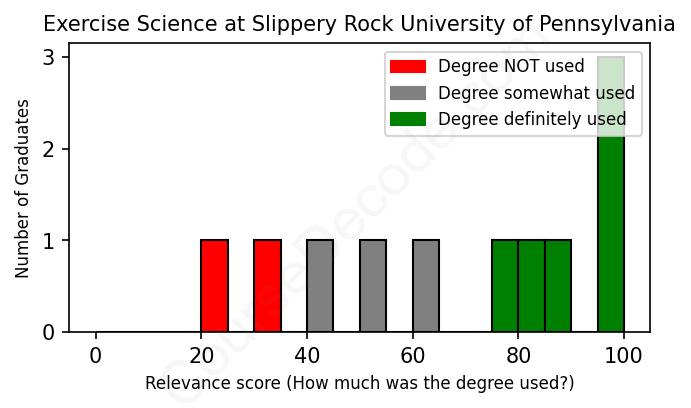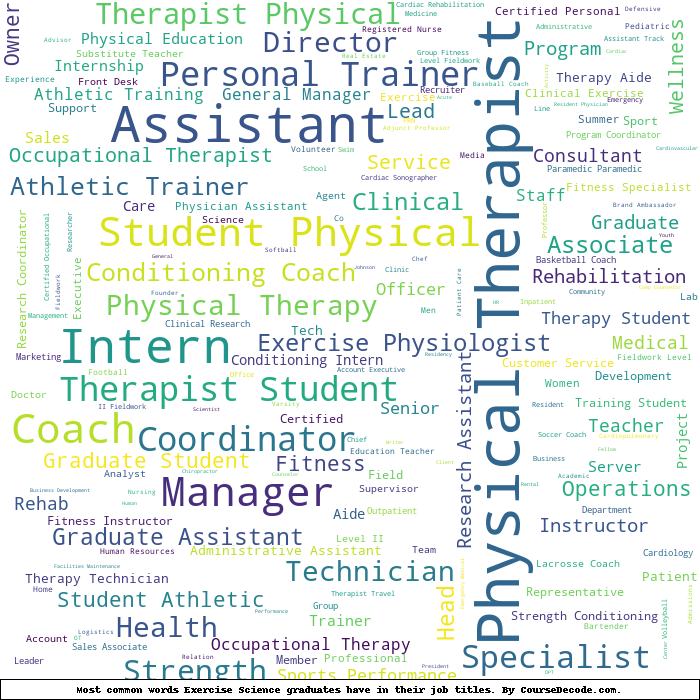
First, some facts. Of the Exercise Science graduates from Slippery Rock University of Pennsylvania we've analyzed , here's how many have used (or NOT used) their degree in their career:

These are estimates based on AI analysis of 11 LinkedIn profiles (see below).
The verdict? Slightly above average. Overall, with an average relevance score of 68%, Exercise Science graduates from Slippery Rock University of Pennsylvania have a slightly higher likelihood (+1%) of finding work in this field compared to the average graduate across all fields:
And for comparison, here's the chart for all profiles we've looked at across all degrees.
Also, after graduating, 72% of these graduates have pursued further education other than another Bachelor's degree (such as a Masters degree or other), compared to the average across all profiles of 35%. This suggests you may need more than just a Bachelors degree to be competitive as a Exercise Science graduate.
See the details:
|
Relevance score: 100% We think this person has gone into a career highly relevant to their degree. We think this person has gone into a career highly relevant to their degree.
DEGREE INFOGraduated in 2018 from Slippery Rock University of Pennsylvania with a Bachelor's of Science in Exercise Science. Also pursued further education since (see below). JOB HISTORY SINCE GRADUATIONStudent Intern Berry Hill Chiropractic & Wellness Nov 2022 - Feb 2023 Doctor of Chiropractic  The Joint Chiropractic Mar 2023 - Present FURTHER DEGREES DONE SINCE GRADUATINGUnknown degreePalmer College of Chiropractic 2019 - 2023 ABOUTPalmer College of Chiropractic Graduate. Proficient in Diversified, Gonstead, Thompson, and Activator techniques. |
The top 10 most common jobs done by the graduates we've analyzed (ranked most common to least) are:
When looking at the career paths of people who majored in Exercise Science at Slippery Rock University, it’s clear that they tend to gravitate towards jobs that either directly utilize their degree or at least touch on the field. The most common roles are personal trainers, exercise physiologists, and wellness coordinators. These positions typically require a solid grasp of exercise concepts and are all about promoting physical fitness, health, and rehabilitation. Personal training, in particular, is a strong fit since it involves customizing exercise plans, which is a core aspect taught in Exercise Science programs.
However, not all job choices seem aligned with what students learned in their degree. Some have taken on roles that are more administrative or managerial, like being a general manager at a gym, which may involve overseeing operations rather than applying exercise science principles directly. Others have ventured into unrelated fields, like health education or logistics. While there are definitely strong, relevant positions, there’s a notable mix, suggesting that some graduates may find themselves in roles that only loosely connect to their degree. Overall, it looks like many went into exercise-centric jobs, but there’s also a fair number who moved in different directions, showcasing a bit of the flexibility and broad applicability of the skills they gained during their studies.
Here is a visual representation of the most common words in job titles for Exercise Science graduates (this is across all Exercise Science graduates we've analyzed, not just those who went to Slippery Rock University of Pennsylvania):

Graduates from the Exercise Science program at Slippery Rock University of Pennsylvania seem to have a pretty solid footing in careers directly related to their field. Right out of college, many of them kick off their careers with internships or entry-level positions like exercise specialists, personal trainers, or research assistants. For instance, graduates from 2010 to 2018 often nabbed roles in hospitals or health systems as exercise physiologists or cardiac rehabilitation interns. These early roles provide good foundational experience, setting them up for more specialized positions or advancing in the healthcare industry as they gain experience.
Fast forward about five to ten years, and many of these graduates appear to have found their niche, either continuing their work in exercise physiology or exploring related areas like health education and wellness coordination. A good number of them have transitioned into roles that focus on health promotion and preventative care, indicating that their initial career paths have evolved but stayed relevant to exercise science. However, there are a few cases where alumni have veered off into less direct paths, like management roles at fitness centers or even positions within government health departments. Overall, it looks like a decent portion of Slippery Rock Exercise Science graduates has managed to build fulfilling careers tied to their studies, while a smaller group has shifted into roles that, although not directly aligned, still utilize some of the skills they learned in their degree program.
Hey there! So, getting a Bachelor’s degree in Exercise Science, whether at Slippery Rock University or elsewhere, can be a bit of a mixed bag. Generally speaking, it’s not as tough as some degrees like engineering or pre-med, but it definitely has its challenges. You’ll be diving into subjects like anatomy, physiology, and biomechanics, which can be pretty intense if you’re not into science. But if you’re passionate about fitness and health, those classes can actually be pretty interesting! Plus, there’s usually a hands-on component with labs or practical experiences that can make learning more engaging. Overall, it’s about what you put into it—stay on top of your studies, and you should do just fine!
Most commonly, in the LinkedIn profiles we've looked at, it takes people 4 years to finish a Bachelor degree in Exercise Science.
Looking at the job paths of these Exercise Science graduates from Slippery Rock University, it seems like they're carving out a decent living for themselves, though it might not be the most lucrative field out there. A lot of the roles start off with internships or entry-level positions, like personal training and fitness coordination, which are pretty common when you're starting out. However, as they gain experience, many have transitioned to positions like Exercise Physiologists or health specialists, which typically pay better. Still, some of them seem to take a roundabout route, switching companies or even industries altogether, like moving into management or education roles. Overall, while a few may have found more stable and lucrative positions, others might struggle a bit at the entry-level salaries, so it's really a mixed bag!
Here is a visual representation of the most common words seen in the "about" section of LinkedIn profiles who have a Bachelor degree in Exercise Science (this is across all Exercise Science graduates we've analyzed, not just those who went to Slippery Rock University of Pennsylvania). This may or may not be useful:

Here are all colleges offering a Bachelor degree in Exercise Science (ordered by the average relevance score of their Exercise Science graduates, best to worst) where we have analyzed at least 10 of their graduates:
| College | Score | Count |
|---|---|---|
 University at Buffalo University at Buffalo
|
81 | 10 |
 Grand Valley State University Grand Valley State University
|
68 | 10 |
 Appalachian State University Appalachian State University
|
68 | 14 |
 Slippery Rock University of Pennsylvania Slippery Rock University of Pennsylvania
|
68 | 11 |
 Kennesaw State University Kennesaw State University
|
56 | 10 |
 Brigham Young University Brigham Young University
|
51 | 26 |
 The University of Tennessee at Chattanooga The University of Tennessee at Chattanooga
|
44 | 10 |